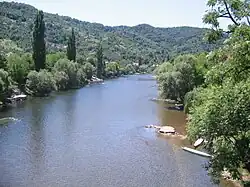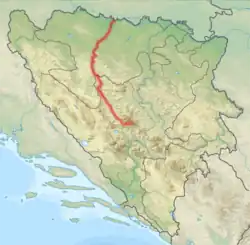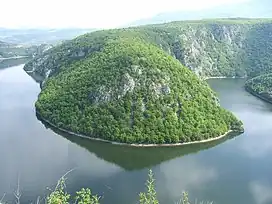Vrbas (river)
The Vrbas (Serbian Cyrillic: Врбас, pronounced [ʋr̩̂ba(ː)s]) is a major river with a length of 250 kilometres (160 mi), in western Bosnia and Herzegovina. It is a right tributary of the Sava river. The city of Banja Luka is located on the river banks.[2][3][4][5]
| Vrbas | |
|---|---|
 Vrbas River in Bosnia and Herzegovina  | |
| Location | |
| Country | Bosnia and Herzegovina |
| Physical characteristics | |
| Source | |
| • location | Vranica |
| Mouth | |
• location | Sava |
• coordinates | 45.108°N 17.514°E |
| Length | 249.7 km (155.2 mi) [1] |
| Basin size | 6,274 km2 (2,422 sq mi) [1] |
| Basin features | |
| Progression | Sava→ Danube→ Black Sea |
Etymology
The word vrba means 'willow' in Serbo-Croatian, and a number of weeping willow trees adorn the river banks in Banja Luka.
It lent its name to one of the provinces (banovinas) of the Kingdom of Yugoslavia, the Vrbas Banovina.
Tributaries
The most important right tributaries are the Desna river, the Ugar, and the Vrbanja, and left: Prusačka river, Semešnica, the Pliva, the Crna Rijeka (Black River), and the Suturlija, which are located in the middle part of the basin.[6]
Geography and sectioning
It is a right tributary of the river Sava. It is one of the largest rivers in Bosnia and Herzegovina.
Upper Vrbas
The Vrbas river appears at the southern slope of the Vranica mountain near the town of Gornji Vakuf, at around 1,530 metres (5,020 ft) above sea level and it drains central part of the northern slopes of the Dinaric mountain massif. The Upper Vrbas is a section between its source and town of Jajce, encompassing entire valley between Bugojno, Gornji Vakuf-Uskoplje and Donji Vakuf, and gorge between Donji Vakuf and Jajce.
Middle Vrbas
Middle Vrbas mostly comprises a canyon section, with steep slopes and narrow passages, between Jajce and Banja Luka.
Lower Vrbas
The Lower Vrbas is the last section of the river, passing through lowlands of Lijevče Polje, approaching the Sava River. It empties into the Sava river at around 90 metres (300 ft) above sea level. Total length of the main watercourse is around 250 kilometres (160 mi).
Climate
Average annual rainfall is around 800 L/m2 at the mouth of the Vrbas to the Sava river and up to 1500 L/m2 in the southern part of the basin. Characteristic mean flow is around 34.6 L/s/km2. Maximum rainfall occurs in the southern parts of the Vrbas basin in the late autumn and winter months, with minimum quantities in summer, whereas the northern parts of the basin receive the largest quantities of rain during the summer months (June–July), with the maximum in November and December.
Ichthyofauna
The Vrbas basin is known for an abundant ichthyofauna, rich in species, and recreational and fly fishing are very popular on entire cours of the river. Especially important but critically endangered is huchen, variation of hucho species endemic for the river Danube basin (hence known as Danube Salmon or Danube Taimen; Lat. Hucho hucho). Of all the Vrbas tributaries only the river Vrbanja, and possibly Ugar, also retain healthy population of this endemic fish. Vrbas are headwaters are important spawning grounds for both, huchen and its prey, Common nase (Chondrostoma nasus) and Grayling (Thymallus thymallus).[7]
Tourism and recreation
Rafting is very popular on the Vrbas. It is also one of the most popular form of recreation in Bosnia and Herzegovina. The main attraction of the area is Vrbas canyon.
In 2005, the European Championships in Rafting were held on the Vrbas and the Tara rivers in Bosnia and Herzegovina. According to the International Rafting Federation, the event was hugely successful. In May 2009 the World Rafting Championships were held again in Bosnia and Herzegovina on the Vrbas and Tara rivers.[8]
Gallery
 Near Banja Luka
Near Banja Luka
 The river
The river
References
- "Sava River Basin Analysis Report" (PDF). International Sava River Basin Commission. September 2009. p. 13. Archived from the original (PDF, 9.98 MB) on 2010-07-17.
- Vojnogeografski institut, Ed. (1955): Travnik (List karte 1:100.000, Izohipse na 20 m). Vojnogeografski institut, Beograd.
- Spahić M. et al. (2000): Bosna i Hercegovina (1:250.000). Izdavačko preduzeće „Sejtarija“, Sarajevo.
- Mučibabić B., Ed. (1998): Geografski atlas Bosne i Hercegovine. Geodetski zavod BiH, Sarajevo.
- "Home". rhmzrs.com.
- "Hes Vrbas". www.hesvrbas.com. Archived from the original on 2005-05-13.
- "Uništavanje bogatog ribljeg fonda u Banja Luci: Mladicu u Vrbasu love i ronioci s puškama". www.dnevnik.ba (in Croatian). Dnevnik.ba. 29 July 2021. Retrieved 30 November 2021.
- WRC2009 in Bosnia and Herzegovina Archived 2009-10-06 at the Portuguese Web Archive
